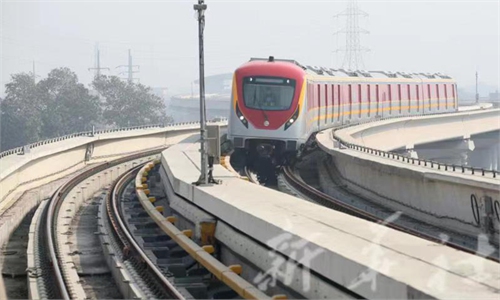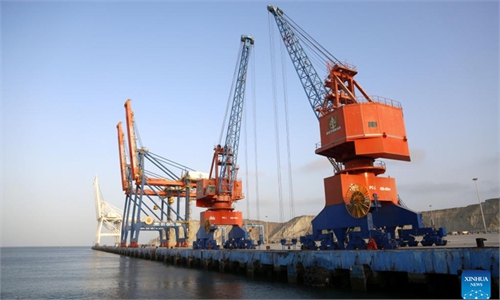Exclusive: Submarines from China-Pakistan cooperation project to join Pakistan Navy fleet soon, says Pakistani naval chief
Brotherly cooperation
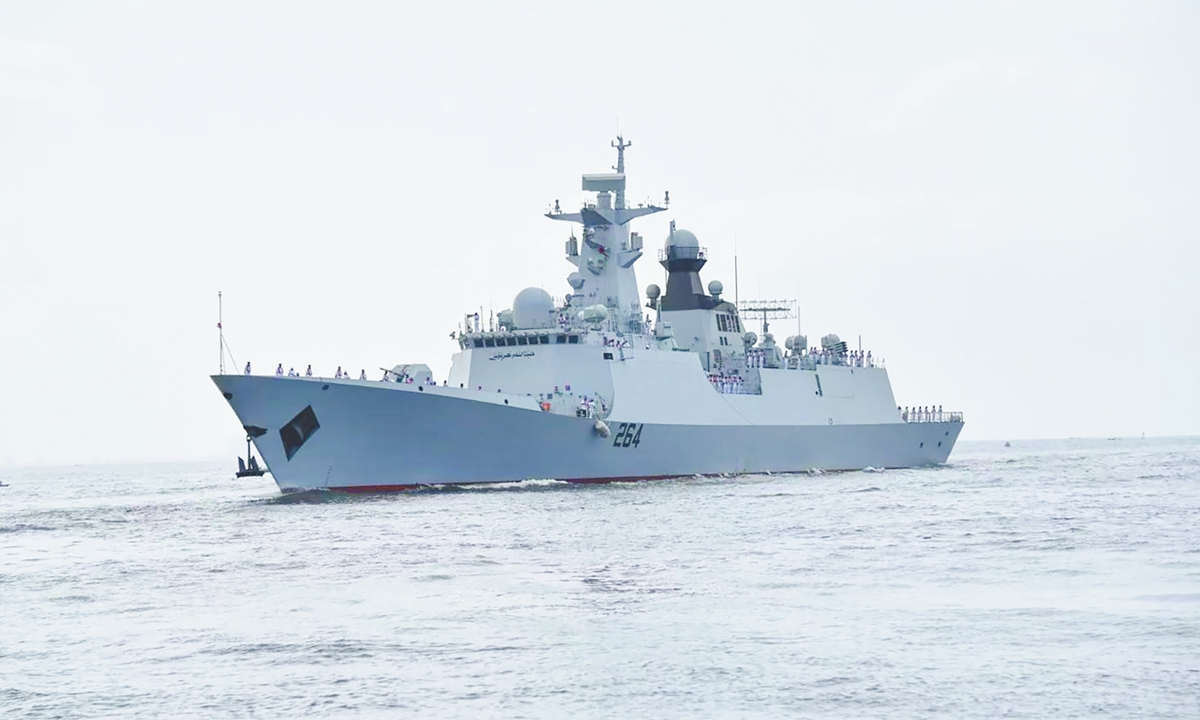
The PNS Shah Jahan, a Type 054A/P guided missile frigate China has built for the Pakistan Navy, sails at sea. Photo: Courtesy of the Pakistan Navy
In recent years, China and Pakistan have been enjoying high level, pragmatic naval cooperation. In addition to joint exercises and training operations such as the Sea Guardian series bilateral exercises and AMAN series multinational exercises, the two countries have also carried out cooperation in military equipment such projects involving Type 054A/P guided missile frigates and Hangor-class submarines.The Pakistan Navy is planning to host the AMAN-25 multinational exercise in early February in Pakistan's southern port city of Karachi. Ahead of the exercise, Admiral Naveed Ashraf, Chief of the Naval Staff of the Pakistan Navy, said in an exclusive interview with the Global Times that the Chinese People's Liberation Army (PLA) Navy has participated in all previous editions of AMAN exercises, and he expects that PLA Navy will participate in AMAN-25 and is looking forward to hosting PLA Navy leadership during the AMAN dialogue.
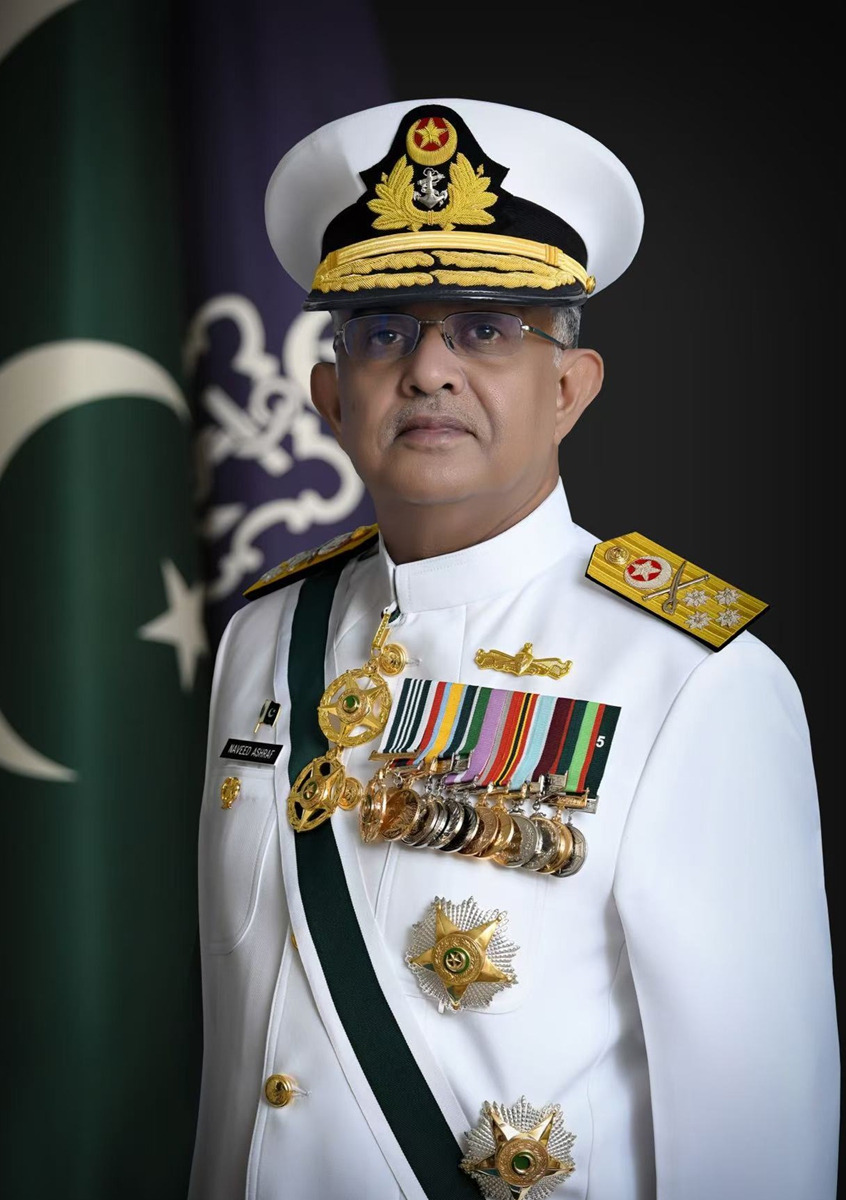
Admiral Naveed Ashraf, Chief of the Naval Staff of the Pakistan Navy. Photo: Courtesy of the Pakistan Navy
AMAN exercises deepen collaborationAshraf told the Global Times that the main objective of AMAN is to foster regional cooperation for the maintenance of good order at sea, improving interoperability, share experiences, understand each other, and exhibit united resolve against terrorism and organized crimes in the maritime domain.
He said that the Pakistan Navy is fully prepared and geared up to conduct AMAN-25 with enhanced participation of friendly countries in a professional and befitting manner.
It is worth noting that the previous edition of the exercise held in February 2023, which witnessed the participation from 50 countries across the globe. "Keeping the same spirit, we are hopeful that this edition will also mark a distinctive chapter in history of AMAN exercises with enhanced participation of friendly countries," Ashraf said.
Ashraf revealed that the maiden AMAN Dialogue will be held in tandem with AMAN-25. "The AMAN Dialogue aims to promote understanding in maritime security issues, finding ways to enhance cooperation at sea, and discussing security linked to the blue economy."
"We have been honored by the regular participation of PLA Navy in all previous editions of AMAN exercises," Ashraf said, noting that this has added highlights to the exercise and is a reflection of the two countries' common resolve to come together for peace and security in the region. "Similarly, we expect that the PLA Navy will actively participate in AMAN-25 also with suitable representation. As I have mentioned earlier as well, the maiden AMAN Dialogue will also be conducted concurrently with Exercise AMAN. So, we are also looking forward to hosting PLA Navy leadership during the dialogue," he said.
Official Chinese media releases previously reported that the PLA Navy flotilla's participation in the AMAN exercises further promoted the PLA Navy's maritime exchanges and cooperation with other participating navies, showing the determination to jointly safeguard maritime security, and boosted the capability in jointly dealing with maritime security threats.
Fruitful naval cooperation
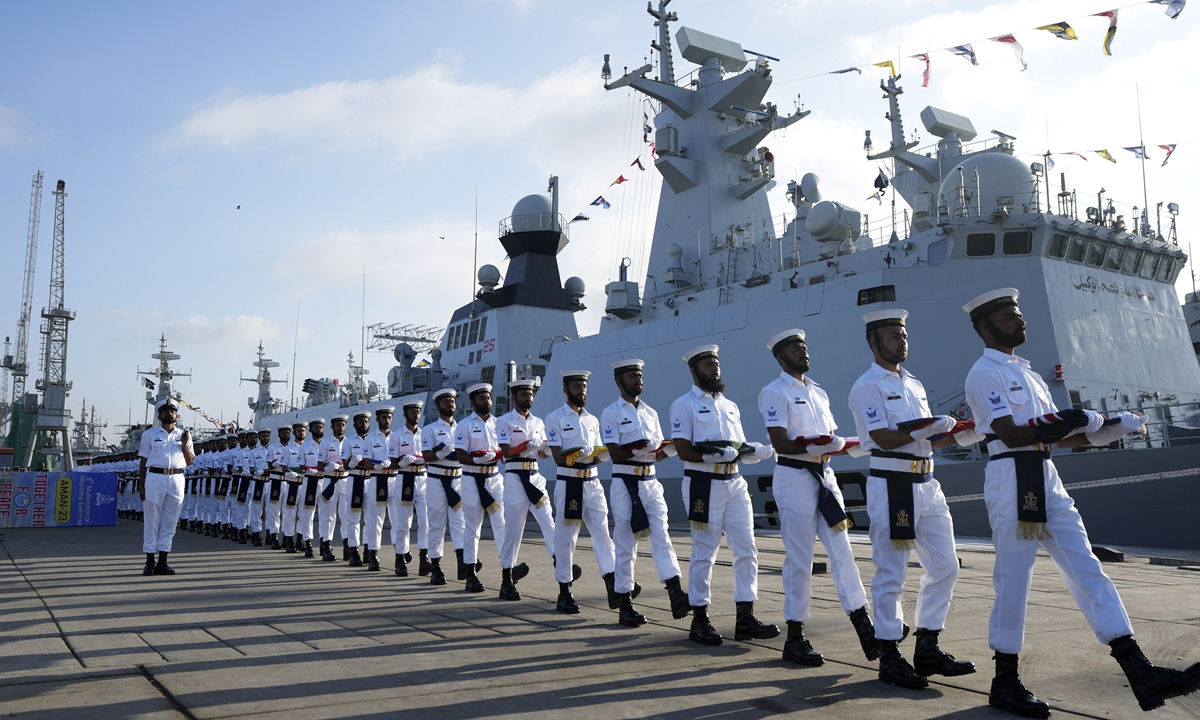
Pakistan Naval personnel carry national flags of participating countries during the opening ceremony of Pakistan Navy's Multinational Exercise AMAN-23 (PEACE), in Karachi, Pakistan, on February 10, 2023. Photo: VCG
Aside from the AMAN series exercises hosted by the Pakistan Navy, China and Pakistan also regularly hold the Sea Guardian bilateral naval drills. The China-Pakistan Sea Guardian-3 maritime joint exercise was held in the waters and airspace of the northern Arabian Sea from November 11 to 17, 2023. In 2020 and 2022, the two countries held the Sea Guardian 2020 and Sea Guardian-2 joint exercises in northern Arabian Sea waters and waters and airspace near Shanghai respectively. The Sea Guardian joint exercises aim to enhance security cooperation between the two sides, consolidate all-weather strategic cooperative partnership, and boost the level of combat-oriented training of the two militaries.Speaking about the achievements the two sides have made from the Sea Guardian series drills, Ashraf said that Pakistan Navy-PLA Navy relations are a reflection of Pakistan-China strategic ties, which includes participation in bilateral and multilateral exercises. In this regard, the Sea Guardian series of exercises amply fulfil the objectives of fostering interoperability and sharing professional experiences to deal with contemporary traditional and non-traditional threats in the Indian Ocean region.
Ashraf introduced the Sea Guardian-3 exercise in detail. He said that the Pakistan Navy units along with PLA Navy frigates, submarine, and aviation units participated in the exercise. The evolution at sea included joint maneuvers, anti-surface, anti-air, and anti-submarine drills. They "provided a useful opportunity to strengthen bilateral naval cooperation and enhance interoperability between two navies. Moreover, we expect that scope of the exercise will gradually increase in coming editions."
In addition, as an important part of the China-Pakistan naval cooperation, all four Type 054A/P frigates built by China have been delivered to the Pakistan Navy. In May 2023, two Type 054A/P frigates built by China for the Pakistan Navy were delivered, marking that all four Type 054A/Ps ordered by the Pakistan Navy have been commissioned. The Type 054A/P is one of the latest multi-role frigates of Chinese origin, equipped with the state-of-the-art weapons and sensors that include CM-302 surface-to-surface missiles and LY-80 surface-to-air missiles, as well as an Advanced Anti-Submarine Warfare suite and Combat Management System, enabling ships of this class to operate under multi-threat scenarios.
Ashraf spoke highly of these four ships. He said that the acquisition of Type 054 A/P is a symbol of enduring friendship and historical affinity between Pakistan and China. Type 054 A/P ships are equipped to operate under multi-threat scenarios and have been fully integrated into Pakistan Navy operations. "The induction of Type 054 A/P frigates in the Pakistan Navy Fleet has bolstered our war fighting capabilities, enhanced operational flexibility, and these ships will remain the mainstay of Pakistan Navy Fleet in coming years."
Moreover, according to a photo provided by the Pakistan Navy, the PNS Zulfiquar, an F-22P guided missile frigate China built for the Pakistan Navy, conducted Operation Himalayan Spirit in the North Arabian Sea in October 2024. The Pakistan Navy seized 1.3 tons of narcotics during the operation.
Other than cooperation in terms of surface vessels, another key project in the China-Pakistan naval cooperation is the joint construction of eight Hangor-class submarines. This type of submarine is equipped with the latest weapons and sensors. With air independent propulsion (AIP) system onboard, the submarine has significantly enhanced submerged endurance capabilities.
According to open reports, Pakistan signed a contract with China to procure eight Hangor-class conventional submarines in 2015, with the first four to be constructed by China and the other four to be assembled by Pakistan, so as to improve Pakistan's technical capabilities. The plan is that Pakistan will obtain the eight advanced submarines between 2022 and 2028. In December 2021, the fifth Hangor-class conventional submarine, also the first one built in Pakistan, officially received a steel cutting ceremony. It marked Pakistan's gaining of the building technology of the world's top-class modern submarine.
Open reports also showed that the first Hangor-class conventional submarine was launched in China in April 2024. In response to the questions "When is the first boat scheduled to enter service, and how is the progress for the four boats being built in Pakistan," Ashraf said that the Hangor-class submarines will significantly enhance Pakistan's naval capabilities. These submarines will provide improved stealth, maneuverability and firepower, allowing our Navy to execute a wide range of operations effectively. "The project is proceeding as per the timeline. We expect that these submarines will join the Pakistan Navy fleet very soon," Ashraf said.
New fields to be explored

A China-built Z-9 shipborne helicopter of the Pakistan Navy flies over the sea. Photo: Courtesy of the Pakistan Navy
Talking about the future of Pakistan-China naval cooperation, Ashraf said that the Pakistan Navy and the PLA Navy enjoys a historically strong deep-rooted bilateral relationship. Close collaboration between the two navies exists across multiple domains including acquisition of platforms, equipment, bilateral exercises, technical cooperation, Navy-to-Navy (N2N) Expert Level Staff Talks, training collaboration, exchange visits, and port calls.According to the admiral, the prospects for future cooperation between the Pakistani and Chinese navies are very broad. "I believe that there is no shortage of avenues for the broadening of our mutual engagements and we are looking forward to establishing long term collaboration in the domains of artificial intelligence, robotics, cyber, and space."
According to a photo provided by the Pakistan Navy, Ashraf visited a shipyard in Wuhan, Central China's Hubei Province in April 2024 and met with the shipyard's representatives during the launching ceremony of the first Hangor-class submarine of the Pakistan Navy.
When asked about his visit to China in April 2024, Ashraf said that he interacted with the PLA Navy leadership, and has found PLA Navy leadership to be highly professional and cordial. "I have no doubt that the PLA Navy is on the way to becoming one of the finest and leading navies in days to come. Moreover, I also believe that with the focused approach of the leadership on both sides, our relations will continue to expand further in times to come."
India is continuously expanding and modernizing its naval fleet and also commissioned its first domestically built aircraft carrier in 2022. In response to the questions, "How has the naval build up might affect regional maritime balance of power, and does the Pakistan Navy plan to eventually operate an aircraft carrier as well," Ashraf said that the Pakistan Navy is a balanced force, which is capable of responding to a full spectrum of conflicts and is optimized to the evolving character of warfare, rehearsed to perform in time-sensitive situations and remains combat ready. Manned by competent human resources, integrated through network-centric warfare, and with a right balance between manned and unmanned assets, our fleet is capable of dealing with diverse maritime challenges.
"While India continues to build its navy, we are not in an arms race. However, we maintain an adequate capacity to accomplish assigned tasks effectively," Ashraf stressed.
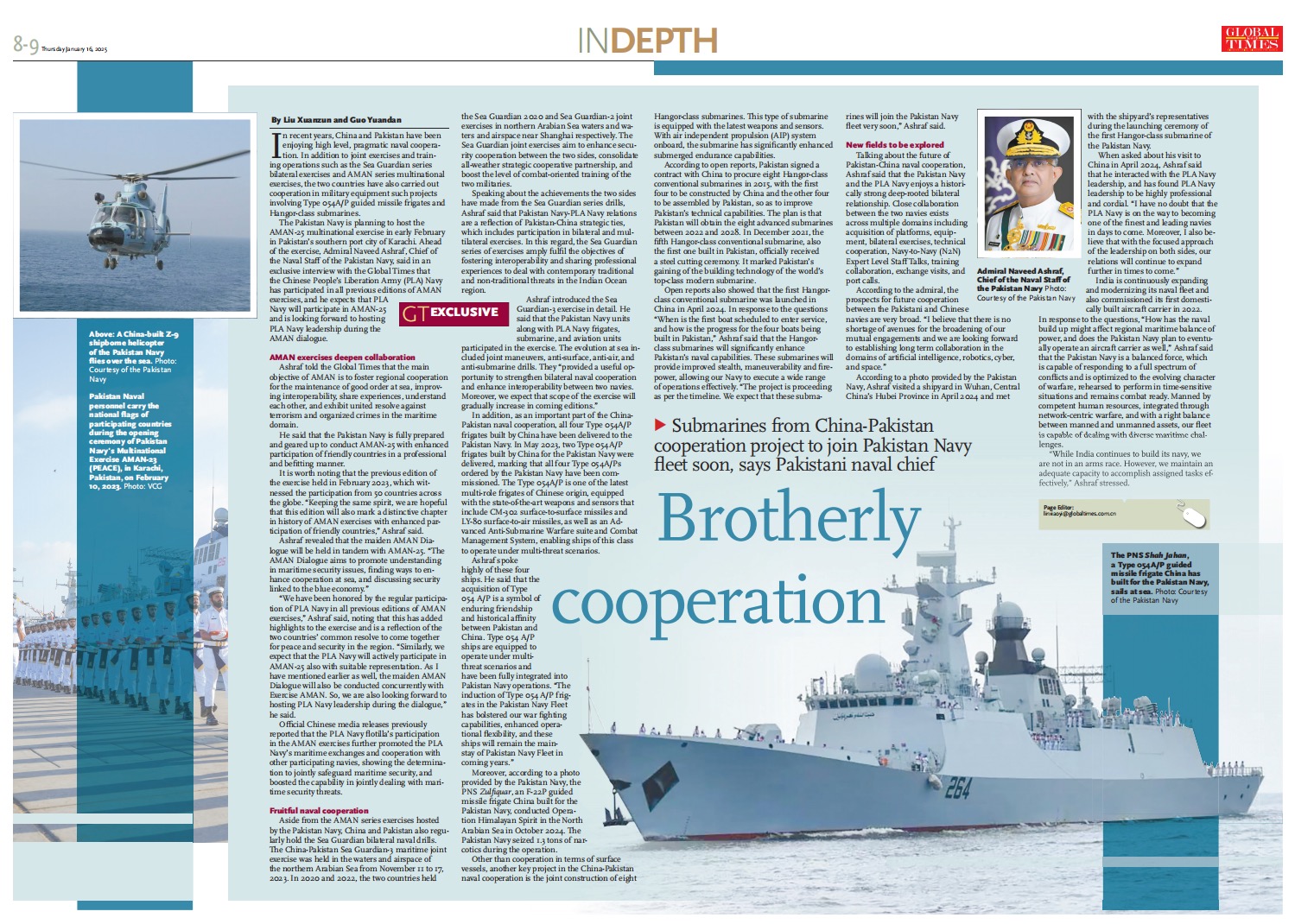
Brotherly cooperation

